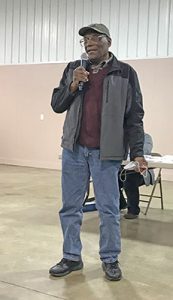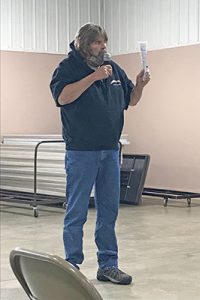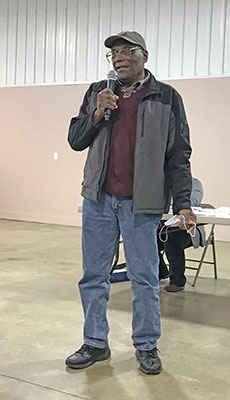
Photo by Wanda Hanson
The regular May 10 meeting of the Houston City Council was held at a new location, the new Community Center, but had many visitors with the same topic on their minds as last month — the proposed OHV trail. Once again, the room was filled with citizens adamantly opposed to the OHV trail.
Steve Westby asked the council who was going to repair the trail and care for it; he suggested creating walking/hiking trails in its place, commenting that the cost of such a trail would be about half as much with little upkeep. The OHV clubs from the Twin Cities supposedly will take care of the trails, but Westby, as well as Houston’s former maintenance man, both felt that Houston’s city maintenance department would be “strapped with the park after the novelty wore off in a season or two.” Westby asked if the council knew how much it would cost to care for the trail.
Anna Benda shared her concern that a rock might roll down into her nearby yard and possibly injure her children. She noted that homeowner’s insurance won’t cover personal injury from man-made landslides. She added that according to her research Colorado is the only state that allows OHV trails this close to houses.
Benda declared, “The mark of a good city council is that people don’t come, and, when they do come, a better city council listens to them.” She went on to repeat the request for a hiking trail in place of the OHV trail and the moving of the OHV trail out of town. (This is unlikely to happen since Houston County does not allow OHV trails.) Benda shared that the DNR has a regional trail grant that Houston would qualify for and that the land that Houston has purchased with $400,000 grant money could be transferred to such a trail.
Sandy Fitting and Scott Wallace asked for a feasibility plan, a business plan for the trail. Wallace asked if perhaps the county EDA could help with this. Councilman Cody Mathers replied that the city doesn’t want to spend more money, potentially $15,000 to do this at this time. There would be no funding available to cover the expense. Wallace added that the community has to be in favor of the trail in order for it to be successful.
Karla Bloem, executive director of the Owl Center, addressed the council to clarify rumors that have appeared on social media. She shared that she was not organizing the citizen group (Save Our Bluffs). The Owl Center is acting as a fiscal agent to retain the Save Our Bluffs money in their fundraising. She emphasized there has been no attempt to overfundraise and she is not getting paid to help with this. She informed the council that taxes lost on the homes purchased in order to build the new center will amount to $3,700, but shared that bringing in 40,000-50,000 visitors to Houston in a year is worth more than that.
The council appears to be hearing the citizens. Later in the meeting City Administrator Michelle Quinn told the council an archaeological study will need to be completed for the OHV trail grant. At this point, the council instructed her to wait on the study. They also decided to wait on the economic impact study, and the noise study is on hold. Quinn informed the council she was waiting for information back on what an exit plan would look like. If the OHV trail does not proceed, the city will need to return the $400,000 that was used to purchase the land for the trail.

Photo by Wanda Hanson
“Regular” City Council Business
Thurman Tucker from Quail Forever appeared before the council to share that his organization wants to form a partnership with the Nature Center to work with high school students on improving a minimum of 500 acres of habitat for the bob white quail in Houston County. He has been working with schools throughout Houston County. A field day has been planned for Spring Grove students and CP33 program participants in May.
The council approved the bonding for the wastewater treatment plant and the payment of the first portion of the plant ($78,094.75).
Dylan Schultz was added to the fire department with a shortened probation period of 6o days. A resident of Houston, Schultz is currently on the Hokah Fire Department and has completed the necessary training.
Summer activities in Houston got the green light—summer rec staff was hired, and the lease for the high school fields was approved. Houston Hoedown was given a temporary liquor license. The addition of wood chips to the Mission 66 Playground was tabled; although free volunteer labor from high school students was available, there is a question about which wood chips are needed for wheelchair accessibility.
The new community center needed attention from the council. They chose to continue Plunkett’s Service to control pests at the old center and add the new center as well. The broken up sidewalk in front of the new center will be replaced. The building also needs gutters before winter, but Randy Thesing, City Maintenance superintendent, will be getting clarification of the bids before they proceed with the installation.
The junk by the main road in the Industrial Park is still an issue; however, because the city does not have written complaints from citizens, it cannot proceed with actions. If this situation bothers citizens, they need to write a complaint letter to get something done about it.
In other business, the council officially approved a mutual aid agreement with Caledonia Ambulance, and learned the newest fire department pumper needed repair since it can’t hold pressure.
The next meeting of the Houston City Council will be June 14 at 6 p.m. in the new community center. The public is welcome to attend.


Leave a Reply